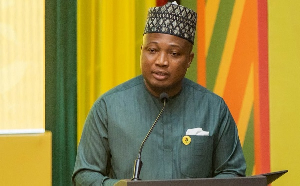Citizen Amidu’s Victory: What are the Implications?
By Kofi Ata, Cambridge, UK
Friday June 14, 2013 will definitely go down as a day of reckoning Ghana, the day that Ghana should be proud of the former Attorney General and Minister of Justice under the late President Prof Atta Mills. At the same time, it is a day of shame for all those who failed to protect and defend the interest of the state, including the former Attorney General and Minister for Justice, Mrs Betty Mould-Iddrisu under whose watch gargantuan amounts of judgement debts were paid to undeserving individuals and organisations as well as the civil servants and judges who did not only let down Ghana but it now appears might have connived to loot Ghana of her scarce resources. That was the day citizen Amidu won a Supreme Court judgement against Waterville Holdings Limited for illegally claiming millions in judgement debt from the state (see, ”Judgment debt saga: Martin Amidu wins case against Waterville” Ghanaweb, June 14, 2013). In this article, I intend to discuss this historic judgement and its implications.
I am not sure whether the dead can hear or read but if so, then, I suspect the late President Atta Mills must be regretting in his grave for his decision to sack Mr Martin Amidu over this matter. I recognise that, he might have acted to instill discipline within his cabinet as we were made to believe that Amidu was sacked for insubordination. But the question is, even if Amindu’s modus operandi was wrong, did the late president take into consideration, the common good? Is it not true that sometimes the end justifies the means?
From the comments of the Justices on the Waterville and Woyome claims and information on other judgement debts payments revealed by the Sole Commissioner for Judgement Debts, there is no doubt in my mind that, judgement debt is one of the most dangerous and organised corruption in Ghana. It is a money making enterprise organised and executed by cabal of individuals, organisations and professionals (unscrupulous lawyers, politicians, senior civil servants at ministries such as Finance and Economic Planning, the Attorney General’s Department and Ministry of Justice and the judiciary, particularly judges).
Judgement debt claims and payments are the direct consequences of the negligent or dereliction of duty on the part of politicians and senior civil servants to ensure that agreements and contracts they sign and often given to their cronies without following the due process are watertight. These same politicians and civil servants whether still in or out of office turn round to advise and actively encourage the benefactors of such contracts to pursue claims against the state. In most cases, they are catalysts to the process by facilitation through the provision of confidential state documents to the claimants to ease their claims. Politicians in office fail to scrutinize such claims, become complicit and aid the claims either through failure to contest such claims in court or enter into voluntary arrangement to honour the claims as was the case of negligence on the part Mrs Betty Mould Iddrisu.
Without the connivance and negligent of senior civil servants, especially those at Attorney General’s Department and Ministry of Justice who also fail to subject the claims to robust examination and investigations and deliberately or knowingly provide wrong advice and recommendations to their superiors (ministers) not to contest the claims but to pay, as in the roles played by Messrs Paul Asimenu, the Director of Legal at the Ministry of Finance and Economic Planning (MOFEP) and Samuel Nerquaye-Tetteh, Chief State Attorney at the Attorney General’s Department as contained in the Economic and Organised Crime Office (EOCO) report on the Woyomegate. In any democratic society, Mr Nerquaye-Tetteh would have been sacked from his job and prosecuted for causing financial loss to the state (apart from the conflict of interest when his wife subsequently received payment from Mr Woyome).
Then the last stage is the state sabotage or failure of the judiciary, the Judges who do not scrutinise the claims, even if the state does not contest them in court and instead order default judgement against the state for payments of huge sums of money to thieves and criminals in this day light armed robbery enterprise against the state. I accept that, it is not the duty of Judges to put up defence for the state against claimants but they are duty bound to ensure equity and fair play in administering or dispensing justice. Their failure to ensure that the claims are justified and deserving should an indictment on the conscience of those Judges who have granted and ordered the payments of frivolous and illegal judgement debts claims against the state.
You might wonder why all these state officials who have a duty to protect and defend the state not only failed to do so but actually participated in the pillage and plundering of the state. The answer is not far fetched and to borrow Counsel Addison’s words, it’s about “taking a bite of the cherry”. It should be obvious that, all these officials feign negligent in order to benefit from the booty. This is evidently clear from the comments by Supreme Justice Dotse, the work of the Sole Judgement Commissioner that Waterville, Woyomegate and other judgement debts claims are well organised and executed by criminals and fraudsters.
June 14, 2013 should be a sad day for Ghana because the state has been deprived of billions of money that could have gone into education, health, infrastructure development and many essential projects or to pay salaries of public sector employees. Sadly, they have ended up in private pockets. All these state officials should bow down heads in shame for their individual and collective failures.
To check and put a stop to this wanton dissipation of scarce state resources and this criminal enterprise, the Mahama government must act without delay to suspend any pending judgement debt payments and subject them to review to assess if they fall within the Waterville and Woyogate type in order to lodge appeals at higher courts to reverse them. For this purpose, a Taskforce of experts and strong lawyers should be created under the Presidency to conduct such reviews and appeals. Such experts should include people from outside government and the public sector. In other words, those from the private sector should be hired for their services if necessary. I will suggest that if practical, Mr Martin Amidu could head this Presidential Taskforce.
The Sole Judgement Debt Commissioner could refer questionable judgement debts to the Taskforce for further action. Again, the final recommendations of the Sole Commissioner could be implemented by this Taskforce.
The most critical is that, the government should act quickly to recover all such monies that have been paid illegally to individuals and organisations before they file for insolvency or bankruptcy and vanish into thin air to enjoy their ill gotten wealth. Last but not the least, such individual and corporate organisations should be prosecuted for fraud.
The government should not stop there but take steps to investigate all allegations of corruption and embezzlement by state officials since it took office and inform the public about the outcome of such investigations and any action/s following the investigations. Often, Ghanaians are assured of government investigations into such matters but nothing is heard about the outcome, such as the gold export earlier this year.
All state officials who have colluded with individuals and organisations to squander the country’s scare resources must be investigated and if found culpable, prosecuted for causing financial loss to the state. Those still in the employment of the state should be summarily dismissed, if found guilty.
One wonders what anti-corruption institutions such as the Commission for Human Rights and Administrative Justice (CHARJ) and EOCO have been doing when it took citizen Amidu to chalk this victory. If they lack the resources and the requisite expertise to do their work effectively, especially, in investigating corruption, then the government must adequately resourced them. A percentage of any money recovered from their investigations could be reinvested into resourcing them.
The fourth arm of government, the media should also play an active role in fighting this cancer in Ghanaian society. Corruption against the people of Ghana has no political colours so all media outlets must join the fight against this menace.
As for citizen Amidu, the once villain or pariah in his party, there is no doubt that he is now the Hero of many Ghanaians. His place in history is assured and possibly, a potential presidential candidate for NDC after President Mahama. The stone that the builder rejected will became the headstone as in Psalm 118 verse 22. He deserves the highest State Honour if not the Nobel Price for Anti Corruption Crusade. We need more of Vigilante Citizen Amidus in Ghana. President Mahama should seriously consider bringing him back into government in his next reshuffle or appoint him minister at the Presidency with special responsibilities for Judgement Debts. Ayekoo, Martin.
Kofi Ata, Cambridge, UK
Opinions of Monday, 17 June 2013
Columnist: Ata, Kofi














